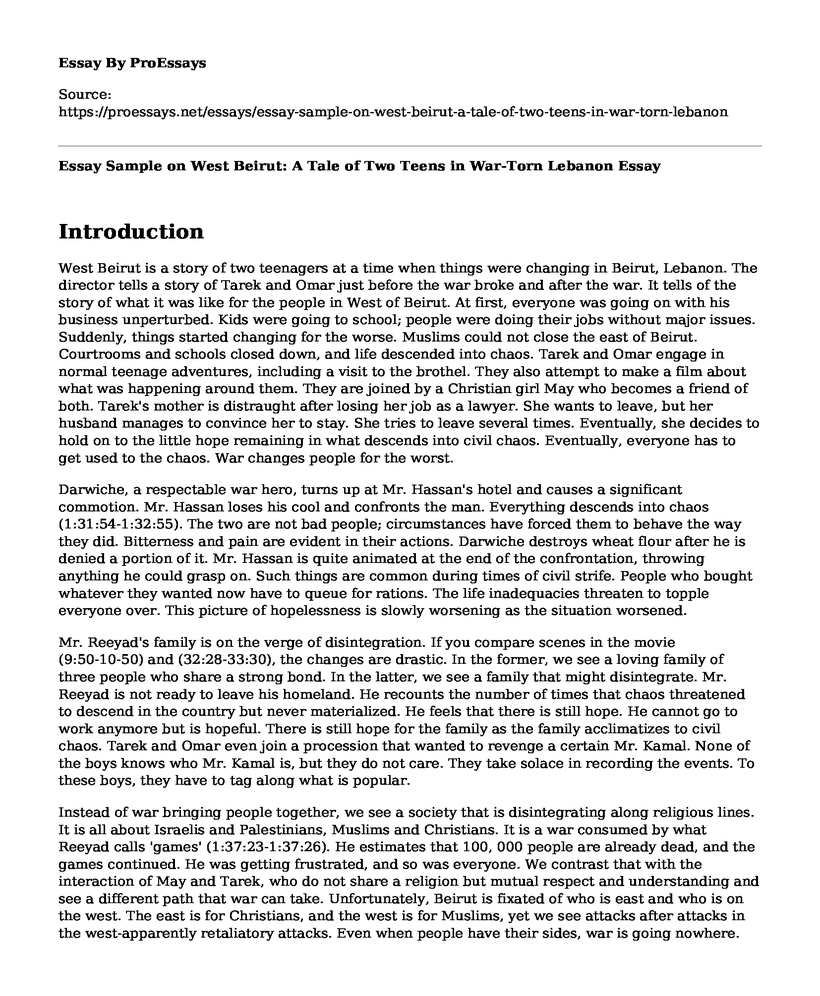Introduction
West Beirut is a story of two teenagers at a time when things were changing in Beirut, Lebanon. The director tells a story of Tarek and Omar just before the war broke and after the war. It tells of the story of what it was like for the people in West of Beirut. At first, everyone was going on with his business unperturbed. Kids were going to school; people were doing their jobs without major issues. Suddenly, things started changing for the worse. Muslims could not close the east of Beirut. Courtrooms and schools closed down, and life descended into chaos. Tarek and Omar engage in normal teenage adventures, including a visit to the brothel. They also attempt to make a film about what was happening around them. They are joined by a Christian girl May who becomes a friend of both. Tarek's mother is distraught after losing her job as a lawyer. She wants to leave, but her husband manages to convince her to stay. She tries to leave several times. Eventually, she decides to hold on to the little hope remaining in what descends into civil chaos. Eventually, everyone has to get used to the chaos. War changes people for the worst.
Darwiche, a respectable war hero, turns up at Mr. Hassan's hotel and causes a significant commotion. Mr. Hassan loses his cool and confronts the man. Everything descends into chaos (1:31:54-1:32:55). The two are not bad people; circumstances have forced them to behave the way they did. Bitterness and pain are evident in their actions. Darwiche destroys wheat flour after he is denied a portion of it. Mr. Hassan is quite animated at the end of the confrontation, throwing anything he could grasp on. Such things are common during times of civil strife. People who bought whatever they wanted now have to queue for rations. The life inadequacies threaten to topple everyone over. This picture of hopelessness is slowly worsening as the situation worsened.
Mr. Reeyad's family is on the verge of disintegration. If you compare scenes in the movie (9:50-10-50) and (32:28-33:30), the changes are drastic. In the former, we see a loving family of three people who share a strong bond. In the latter, we see a family that might disintegrate. Mr. Reeyad is not ready to leave his homeland. He recounts the number of times that chaos threatened to descend in the country but never materialized. He feels that there is still hope. He cannot go to work anymore but is hopeful. There is still hope for the family as the family acclimatizes to civil chaos. Tarek and Omar even join a procession that wanted to revenge a certain Mr. Kamal. None of the boys knows who Mr. Kamal is, but they do not care. They take solace in recording the events. To these boys, they have to tag along what is popular.
Instead of war bringing people together, we see a society that is disintegrating along religious lines. It is all about Israelis and Palestinians, Muslims and Christians. It is a war consumed by what Reeyad calls 'games' (1:37:23-1:37:26). He estimates that 100, 000 people are already dead, and the games continued. He was getting frustrated, and so was everyone. We contrast that with the interaction of May and Tarek, who do not share a religion but mutual respect and understanding and see a different path that war can take. Unfortunately, Beirut is fixated of who is east and who is on the west. The east is for Christians, and the west is for Muslims, yet we see attacks after attacks in the west-apparently retaliatory attacks. Even when people have their sides, war is going nowhere.
Conclusion
In conclusion, the author manages to capture the life of two normal boys who live in Beirut. Before they can know what is happening in their lives, they discover that they are in the west of Beirut. Everyone now is alive to his origin or heritage. Those in the east stay in the east; Muslims remain in the West. Families start to develop problems that they did not have. War tests the resolves of even the soberest minds. It wears people down emotionally and psychologically. People start going on with the crowd. Rationality is cast to the side, and people slowly destroy the social and economic fabric. The Lebanese civil war was no different. The director of the film captures what life was before and what it becomes. We see a group of militia spraying bullets on a harmless woman. Such savagery is the curtain of war, and once the curtains draw, there is no holding the social fabric together.
Work Cited
Doueiri, Z. "West Beirut." 1998. https://www.youtube.com/watch?v=dCkQ7qC0C6I.
Cite this page
Essay Sample on West Beirut: A Tale of Two Teens in War-Torn Lebanon. (2023, Jan 09). Retrieved from https://proessays.net/essays/essay-sample-on-west-beirut-a-tale-of-two-teens-in-war-torn-lebanon
If you are the original author of this essay and no longer wish to have it published on the ProEssays website, please click below to request its removal:
- Screening Tools That Internet Service Providers Can Employ in Regulating Web Content
- Media Art in Poland: Workshop of Film Form
- Health Assignment on Documentary "What the Health" Essay
- Mission and Vision of TJX Essay
- The Beatles: Tomorrow Never Knows by John Lennon Essay
- Essay Sample on Alfred Hitchcock's Psycho
- Essay Example on Hamlet and Oedipus: Literary Classics Relevant Today







